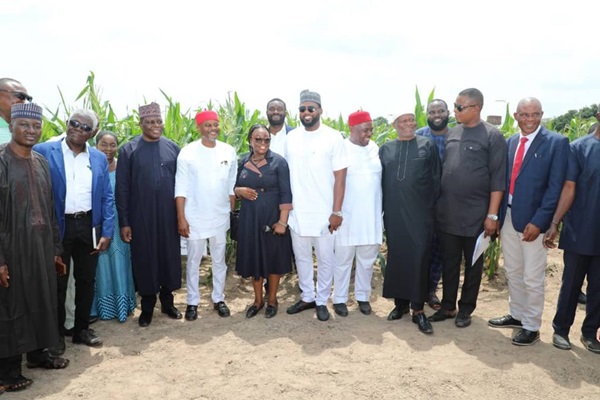
The Minister of Innovation, Science and Technology, Chief Uche Nnaji, has emphasised that Nigeria stands as one of the few nations that harness the power of science and technology to address its challenges, particularly in the realm of agriculture.
Nnaji made this assertion during an official visit and “Seeing is Believing” tour of the Tela Maize project on a farm trial site at the National Biotechnology Development Agency (NABDA) in Abuja.
He noted that the progress achieved in Tela maize, Bt cotton and cowpea represents more than mere scientific milestones.
Tela maize, for instance, is a drought-tolerant and insect-resistant maize variety. It offers protection against drought, stem borers and the innovative fall armyworm (IFA). This resilient maize species, resistant to drought and pests, is indeed a game-changer.
“This innovation will counteract the annual fall armyworm-induced losses exceeding $268 million and save Nigeria significant foreign exchange on the importation of over 400,000 metric tons of maize annually,” he stated.
Furthermore, he highlighted that NABDA’s vision extends across key domains, encompassing agriculture, healthcare, industrial processes, environmental sustainability and economic growth. NABDA is a catalyst for innovation and economic development, leveraging biotechnology to tackle critical national challenges, from agricultural productivity to healthcare and global competitiveness.
Through collaborations with international partners like Bayer, AATF, and others, NABDA has advanced genetic technology adoption. Nigeria stands as the first country worldwide to release pod borer-resistant beans (Cowpea) and the second in Africa to deregulate Tela maize for commercial release.
Nnaji also announced the ministry’s target to inseminate between 3,000 to 5,000 cattle to enhance local breeds and boost milk production.
He emphasised the significance of NABDA’s pioneering work in bioenergy, introducing equipment to assess the bio-methane content of biomass, taking Nigeria closer to achieving 5 per cent biomass energy.
Nnaji pledged to ensure that most Nigerian grain farmers gain low-cost access to this innovative and highly profitable maize variety.
The director-general of NABDA, Prof. Abdullahi Mustapha highlighted the role of STI in enhancing technological infrastructure and fostering innovation and research that drive the nation forward. He outlined NABDA’s core mandate, which includes promoting, coordinating, and deploying cutting-edge biotechnology research and development, processes and products to benefit the nation’s socio-economic well-being.
Mustapha commended Nigerian scientists for their efforts in appreciating and applying modern biotechnology research to improve quality of life and create job opportunities. He noted that the benefits of biotechnology are vast and acknowledged globally and NABDA’s contributions span various fields, from the first, second, to third-generation versions of technology.
NABDA boasts 37 bioresource centres, six centres of excellence located at premier universities, and a specialised center of excellence in Ibadan. These centres, along with various technical departments, play crucial roles in advancing biotechnology in Nigeria.
Mustapha also highlighted NABDA’s ongoing work in developing biotech crops and its collaboration with other institutions to expedite the achievement of President Bola Tinubu’s food security agenda. He mentioned various achievements in the development of test kits, bio-digesters, thermo-resistant yeast, and climate-friendly starter yoghurt culture.
The country director of the Open Forum for Agricultural Biotechnology (OFAB) in Nigeria, Dr. Rose Gidado shared insights into Tela maize, emphasising its suitability for both the dry and rainy seasons, providing flexibility for farmers. She underscored the importance of commercialising Tela maize so that farmers can readily access the seeds and understand how to optimize its cultivation. Irrigation facilities are being prepared to support the maturation of Tela maize.
Additionally, Gidado explained that the genetically modified beans developed by NABDA are resistant to Maruca insects, which cause substantial damage to crops. The new variety ensures farmers can overcome the destruction caused by Maruca, offering protection against up to 90 per cent of losses. With this innovation, Nigeria will reduce its dependence on importing cowpeas, saving billions of naira in the process.

